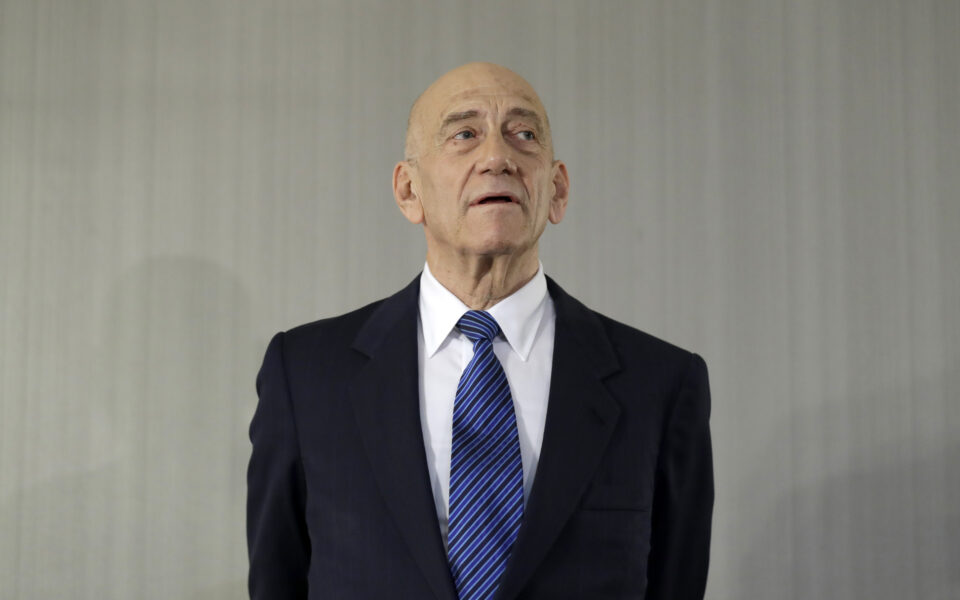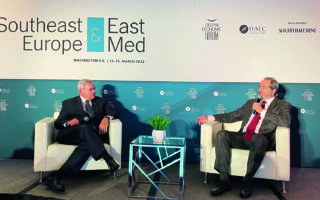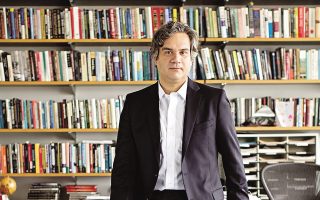Israel won’t tolerate threats to Greece’s integrity
Ex-PM speaks to Kathimerini about the Israeli-Palestinian conflict, bilateral relations, and his country’s stance on Turkish provocations

The former Israeli prime minister Ehud Olmert speaks exclusively to Kathimerini about the possible solution to the Israeli-Palestinian conflict, Israel-Greece relations, and his country’s stance toward Turkish provocations.
Olmert was born in the area of Palestine that was under British Mandate, to parents of Jewish descent persecuted in Ukraine and Russia. In 1973 he was elected a member of the Israeli Parliament (Knesset), where he was re-elected seven consecutive times. In 1993 he was elected mayor of Jerusalem, where he remained until 2003. In 2006, he was sworn in as prime minister of the State of Israel, where he served as prime minister for three years until 2009. His tenure was marked by the Lebanon War (2006), the attempt to reach a lasting solution with the Palestinian Authority (2007), “Operation Orchard” in Syria (2007), as well as “Operation Cast Lead” (2008-09). His political life was affiliated with legal entanglements that led him to prison for 16 months, where he wrote his autobiography “Searching for Peace.”
When was your first brush with this unsolved situation between Israel and the Palestinian side?
It started a lot before I became mayor of Jerusalem. I was first elected to the Israeli Knesset in December of 1973. I became mayor in November of 1993, almost 20 years afterward. Since then, I served five terms in the Knesset, which is a long period of time in which almost continuously the Israeli-Palestinian conflict was on the front line of Israeli politics, the Israeli government, and also the cabinet that I was a member of.
I must say that there is no better perspective for anyone to understand the complexities, the sensitivities, the historical heritage, and the serious difficulties in dealing with this conflict between Israel and the Palestinians, than the position of mayor of Jerusalem. Because Jerusalem is everything. If you cannot solve the issue of Jerusalem, you cannot solve the conflict. You can solve all the other aspects, territorial aspects, everything. But at the end of the day, Jerusalem is the heart of the emotional conflict and this is not something that can be ignored or underestimated.
It took some time for me to understand it. But when I understood it, I knew that the day would come when Israel would have to deal with the issue of Jerusalem, and that may be the solution that would be part of a comprehensive agreement between Israel and the Palestinians, which would change the status of some parts which at that time that I became mayor, were a part of Jerusalem.
What were the main points of the Annapolis peace conference (2007) and how could it have led to a prosperous agreement?
I started the negotiating process with Abu Mazen (Mahmoud Abbas) on December 23, 2006. So there was a yearlong intense process of negotiations between me and the Palestinians before Annapolis. Somehow, at the end of the day, it’s all named the Annapolis process, but it actually started a lot before. The main ingredients of what was eventually the peace plan that I presented Abu Mazen with were actually developing through this year, the end of 2006 until the conference in Annapolis in 2007.
We were ready to pull out from 95% of the territories of the West Bank, and to relocate all the Israelis that lived in those parts that we were to withdraw from. And three demographic centers comprised about 5% of the territories, which would remain under the recognized sovereignty of the state of Israel. But to compensate the Palestinians, Israel would allow a transfer swap of territories so that the 5% that we would maintain more or less 5% in the West Bank, the Palestinians would be compensated with the swap in territories which were part of the State of Israel prior to 1967. So the principle of 1967 was accepted. That was number one.
Number two, I was ready to pull out from the Arab side of Jerusalem. To allow the Palestinians to have that part of Jerusalem as the capital of the Palestinian state. I was ready to pull out from all the parts of Jerusalem which I thought were never really historically part of the Jewish heritage and the Jewish tradition, and which were not that significant for us in order to allow the Palestinians to establish their capital in that part of Jerusalem that they recognized to be their Jerusalem.
Number three was the status of the Holy Basin, including the Old City of Jerusalem, including, of course, the most sensitive part of the Old City of Jerusalem, which is the Temple Mount. What do we do there? I understood. It took me time to understand that the most sensitive parts of Jerusalem are very important. For us the Jews with our history and our heritage in the city of Jerusalem. But they are also very important for the Muslims because of the Al-Aqsa Mosque on the Temple Mount. And they are also very important for Christians because of the churches that are spread all over Jerusalem in general, but particularly the church in the Old City.
I figured out that there would not be peace if there was exclusive political sovereignty for one nation in the Old City of Jerusalem, in the Holy Basin, and particularly on the Temple Mount, if Israel insisted, as many of us still do, on having exclusive political sovereignty. But if there were exclusive political sovereignty for just us, there would never be an agreement, there would never be peace and we would continue to fight forever. And all of us would have good excuses to justify what we do. But peace would not exist. So, what I proposed was that there would not be exclusive political sovereignty over the Holy Basin, not for Israel and not for any other country.
Why did Mahmoud Abbas hesitate to accept the agreement and why did the negotiations fail?
To this day, I know that Mahmoud Abbas thinks that he made a terrible mistake and he knows that he missed an opportunity that may not return. I remember when I sat with him and I said to him, here is the agreement, here is the map that I proposed to you, the territorial map. With all the Israeli withdrawals and all the many settlements, they would have to be evacuated by Israel, and I said, “President, sign it”. And he hesitated and I said: “Listen, I guarantee that no Palestinian leaders will get an offer like this in the next 50 years. So do not miss the opportunity. Sign it now and we will change history.” But he was afraid. I was at the end of my term, he was not sure. There are many divisions within the Palestinian community. Let’s not ignore it.
During your time as Israel’s premier, how were diplomatic ties between Greece and Israel formulated?
They were formulated long before we had good diplomatic relations with Greece. I must say that while I did not have a chance to visit Greece as prime minister at the time that I was prime minister, I love Greece and I had been to Greece many times before I was prime minister and many times after I was prime minister. We had very good relations. We never recognized the threats against Greece as legitimate, in spite of the very close relations that we wanted to build with Turkey, but we never, ever accepted as was spelled out in the most explicit terms to the Turks that we would never tolerate any threat to the integrity and the security of Greece and we had very good relations, commercial relations, diplomatic relations.
What are your views on Turkish provocations and claims in the Aegean Sea and Cyprus?
As far as I think Israel is concerned, while we maintain our friendly relations with Turkey and with Erdogan, I think that the integrity of Greece and the integrity of Cyprus must be on the agenda between us and Turkey, and I hope it will be.
A few days ago Israel’s minister of foreign affairs issued a warning to Israeli citizens not to visit Istanbul due to concerns about Iranian threats.
Yes, but I have to say that Turkey is cooperating with our security in order to protect Israelis that are visiting Turkey. So this warning of Secretary Yair Lapid, to the best of my understanding, was not against Turkey; it was against the Iranians, and it was in order to protect Israelis. And I think that the Turks did cooperate with us to prevent certain terrorist attacks by Iranians in Turkey.
What is the strategic importance of the Israel-Greece alliance?
We are two major Mediterranean countries and I think that the democratic nature of both countries is a very important basis for stability in the entire region and I think that there is no question that under any circumstance, we should maintain very good cooperation between Israel and Greece, as we did all of the last 20 years and we should continue to do it. It is the essential ingredient in guaranteeing security and stability in our part of the world.
Do you think that Israel would be willing to assist Greece militarily or with other means in case of a major escalation?
I hope that there will not be a need for it and I think that we have to use all the power of frustration that we have in order to make sure that it will not happen.
The biggest punishment for Israeli citizens would be that they would not be able to go to the Greek islands, because this is where we all go. Every year, hundreds of thousands of Israelis – sometimes you go to Mykonos, you go to Paros, you go to Corfu, you go to all these places. You cannot cross the street without bumping into many Israelis wherever you go. So Greece is very important for us.
Greece is a neighbor. And the nature of the people there and the history of the relations between the countries is such that, you know, where we need you and you need us. And we will make sure that we can use all the power of persuasion and influence in politics that we have in order to make sure that we will be able to continue these relations to the benefit of both countries.





